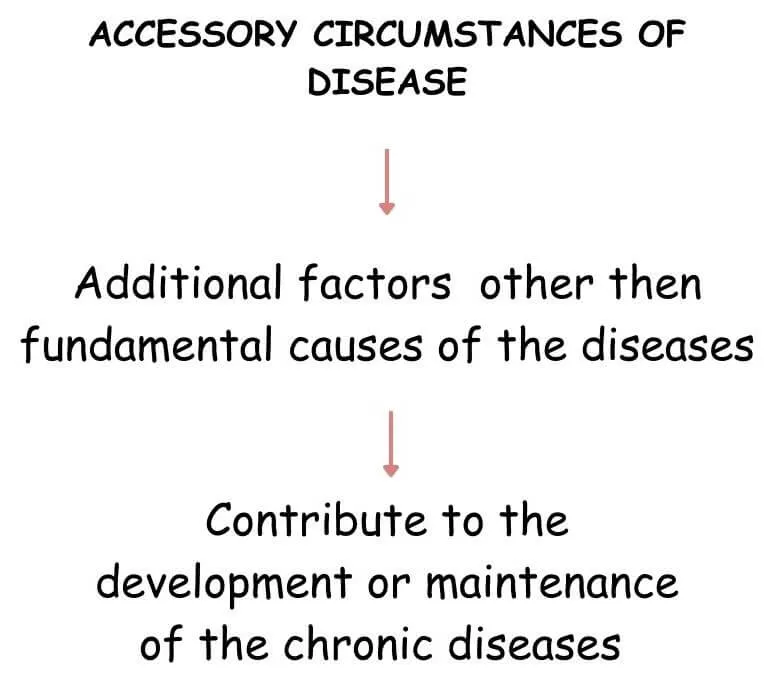
Identifying the Accessory Circumstances (Aphorism 5, 94,208, F.N. of aphorism 81) of diseases play an important role in understanding the root causes of chronic diseases and treat the patient accordingly.
Chronic diseases can be complex and complicated and therefore they are a major health concern worldwide.
According to Dr. Hahnemann, Miasms are the fundamental causes of the chronic diseases.
Read a detailed article in the post on, FUNDAMENTAL CAUSES OF DISEASES IN HOMOEOPATHY.
But, in addition to those causes, there are also some additional factors that can contribute to the development or maintenance of these diseases.
These additional factors are called accessory circumstances of the diseases.
DEFINITION OF ACCESSORY CIRCUMSTANCES
In addition to the fundamental causes of the diseases there are some factors that can contribute to the development or maintenance of the chronic diseases are known as the accessory circumstances of the diseases.

IMPORTANCE OF THE ACCESSORY CIRCUMSTANCES
- Identifying and addressing accessory circumstances is crucial for effective treatment of chronic diseases because if these factors are not addressed, they can continue to contribute to the disease even if the underlying miasm is treated.
For instance,
If a person with a genetic predisposition to diabetes receives an anti-Miasmatic treatment, he still may develop the disease condition if he continues to consume high-sugar diet and lead a sedentary lifestyle.
- Moreover, understanding the accessory circumstances can help to identify the proper fundamental cause of a disease in a specific case, which can guide treatment decisions.
For example,
If a patient with the chronic complain of anxiety and depression develops a chronic skin disease, approaching his mental health troubles may be a determining step in treating the primary cause of the skin complains.
HOW CAN WE FIND OUT THOSE ACCESSORY CIRCUMSTANCES IF ANY?
Dr. Hahnemann have advised seven factors that should be considered while case taking.
- Physical constitution of the patient.
- Moral and intellectual character.
- Occupation
- Mode of living and habits.
- Social and domestic relations.
- Age
- Sexual functions
Each of these factors can have a remarkable influence on the health of a person and play a part in development or progression of chronic diseases.
For instance,
- Some occupational diseases may rise due to constant exposure to environmental toxins.
- Poor diet and lack of exercise influence health outcomes.
- Constant living under stress can increase risk of developing certain diseases.
In conclusion, accessory circumstances are additional circumstantial factors that may contribute to the development or maintenance of chronic diseases.
By such approach, health care professionals can provide patient-centered care that focuses on the primary causes of chronic diseases and so improves overall health outcomes.
